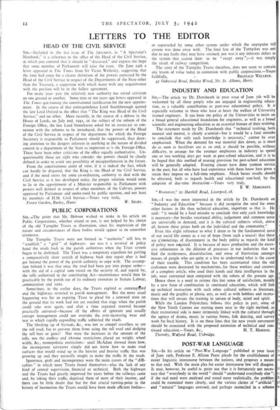HEAD OF THE CIVIL SERVICE
LETTERS TO THE EDITOR
SIR,—Included in the last issue of The Spectator, in "A Spectator's Notebook," is a reference to the office of the Head of the Civil Service, in which you contend that it should be "discussed," and express the hope that some member of Parliament will raise the issue. On June 24th a letter appeared in The Times from Sir Victor Wellesley, suggesting that the time had come for a clearer definition of the powers exercised by the Head of the Civil Service in respect of the Departments of the State other than the Treasury, a suggestion with which many with any acquaintance with the position will be in the fullest agreement.
For many year past the relatively new authority has raised criticism on one ground or another. Some nine or ten years ago letteis appeared in The Times questioning the constitutional justification for the new appoint- ment. In the course of that correspondence Lord Southborough quoted the late Lord Oxford to the effect that "The King was Head of the Civil Service," and no other. More recently, in the course of a debate in the House of Lords, on July znd, 1941, on the subject of the reform of the Foreign Office, the late Lord Stonehaven asked for an assuraace in con- nexion with the reforms to be introduced, that the powers of the Head of the Civil Service in respect of the department fix which the Foreign Secretary is responsible to Parliament should be suppressed, thus draw- ing attention to the dangers inherent in anything in the nature of divided
control in a department of the State as important as is the Foreign Office. There have been other criticisms of the office equally authoritative. Un- questionably those are right who consider the powers should be clearly defined in order to avoid any possibility of misapprehension in the future. From the constitutional point of view, if it is indeed the fact, which can hardly be disputed, that the King is the Head of the Civil Service, and if the need exists for some co-ordinating, authority to deal with the Civil Service as it has developed today, the proper solution would seem to lie in the appointment of a Minister responsible to Parliament with powers well defined in respect of other members of the Cabinet, powers approved by Parliament and understood by public opinion, and not least by members of H.M. Civil Service.—Yours very truly,


























 Previous page
Previous page